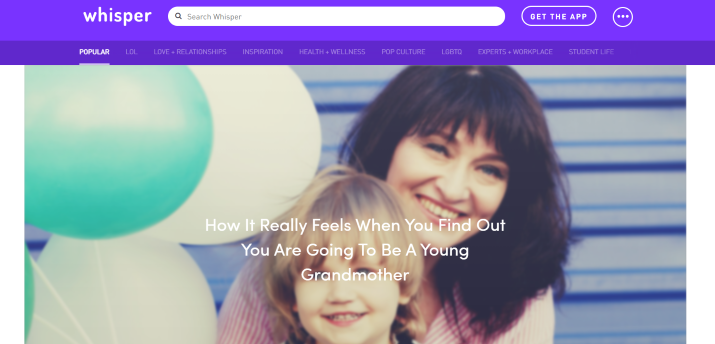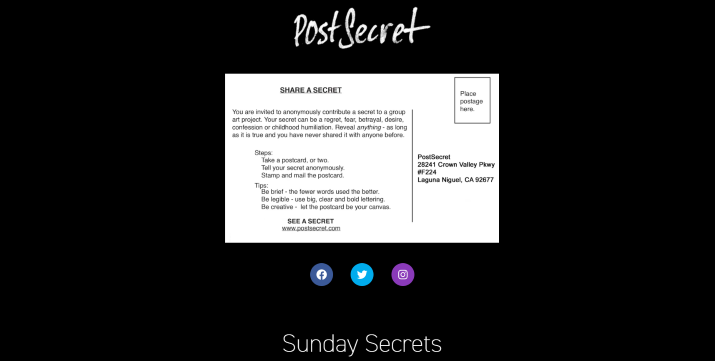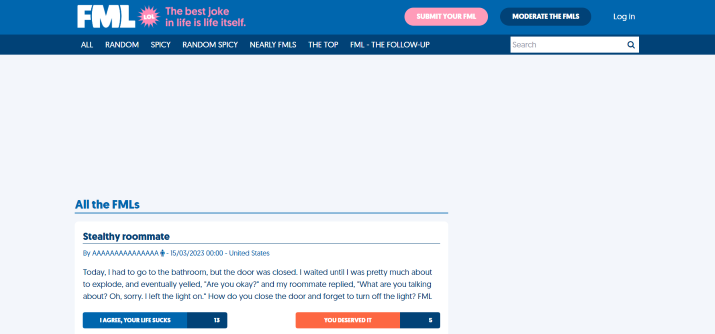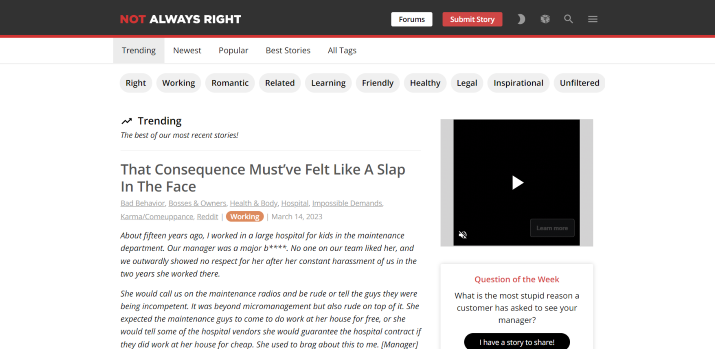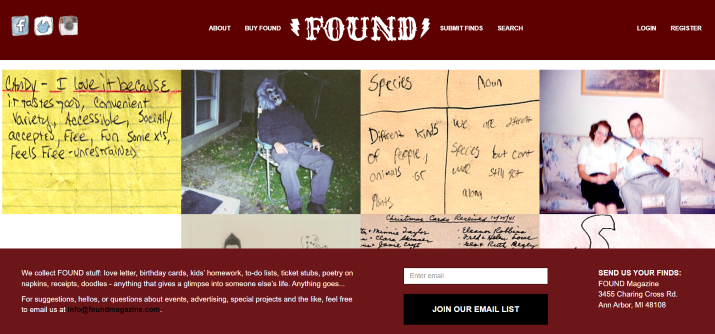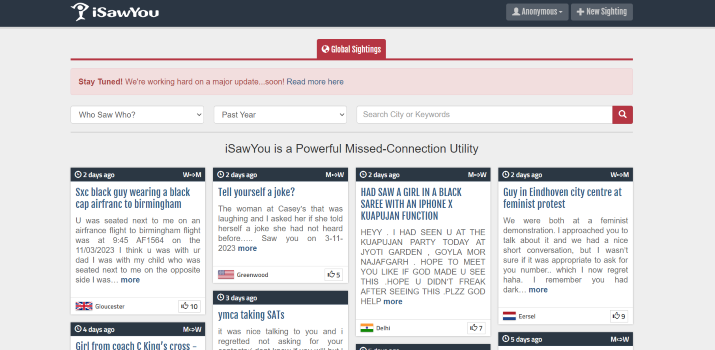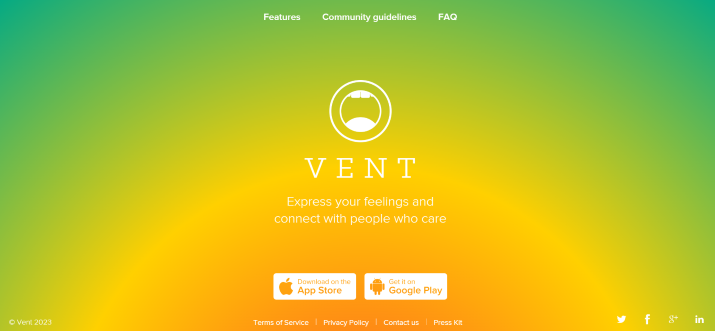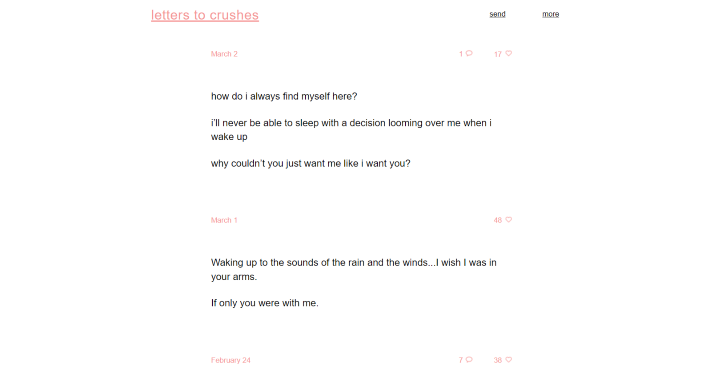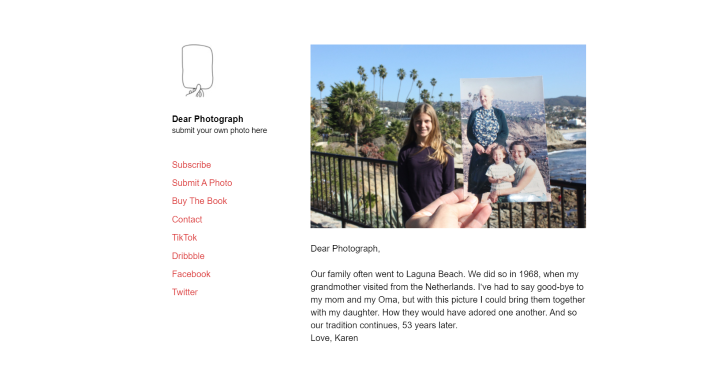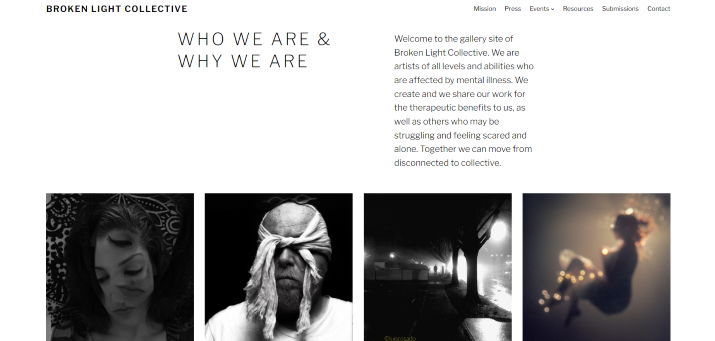The Unsent Project is a website that has taken the world by storm, providing a platform for people to confess their deepest desires, regrets, and fears anonymously.
Unsent letters can be submitted on the website, and users’ tales are shared for others to read and relate to. The Unsent Project has become a famous location for those wishing to reveal their hidden ideas due to the popularity this original idea has attained throughout the years.
Websites like PostSecret, FML, and Not Always Right are suitable replacements for The Unsent Project, but out of them, Whisper is the best website like The Unsent Project. It has a user-friendly interface, a massive community, and is also free to use.
Why do you need other websites like The Unsent Project?
Relying only on this platform may have some disadvantages, despite the fact that it can be a useful avenue for people to express their feelings and opinions. Here are a few reasons why you might require other websites in addition to The Unsent Project.
The Unsent Project mainly focuses on unsent communications relating to relationships. While this may be useful for those going through marital difficulties, it might not be the ideal means of coping for those going through other concerns like stress at work or issues with their mental health. In these circumstances, visiting other websites that focus on these subjects can be better.
Moreover, while posting unsent messages on the Unsent Project can be therapeutic for the author, the subject or circumstance they are writing about might not be much affected. In these circumstances, other websites that provide resources or guidance might be more beneficial.
In this article, we will explore the 10 best websites like The Unsent Project that possess similar features and even more.
Best Websites Like The Unsent Project
1. Whisper
Whisper is a social media platform that enables users to interact with people who have similar interests or experiences and share anonymous messages.
The website, which has millions of users worldwide, was created in 2012 and has since developed into one of the most well-known anonymous social networks.
Whisper’s anonymity is one of its main benefits. Users can communicate their opinions, feelings, and experiences without disclosing their identities, which can be a great tool for anyone looking for a secure environment in which to do so without worrying about criticism or retaliation.
Several more features are also available on Whisper, such as the ability to build and join communities based on interests, as well as the option to communicate with other users privately and publicly.
Also, the platform offers a variety of content, including memes, stories, and personal confessions.
Whisper’s emphasis on mental health and emotional well-being sets it apart from other anonymous social networks.
Users of the site have access to a variety of resources, such as support groups, mental health specialists, and crisis hotlines, for those who are dealing with mental health problems.
Find out more sites like Whisper here.
2. PostSecret
Frank Warren launched the website PostSecret in 2005. Postcards sent to the PostSecret address are used on the service to anonymously exchange secrets. The goal of the initiative is to give people a safe, anonymous platform on which to share their most intimate secrets.
The centerpiece of the website is a gallery of postcards that visitors from all over the world have sent in.
These postcards frequently include a brief note or artwork that symbolizes a secret the sender has never revealed to anybody else. While some of the postcards are humorous, others are sad or meaningful.
Throughout the years, PostSecret has developed into a cultural phenomenon and has been covered by several media outfits which include the New York Times, CNN, and NPR.
Many volumes that have been released over the years including some of the most memorable postcards were also inspired by the project.
One of PostSecret’s distinctive features is its capacity to foster a sense of community among strangers. PostSecret offers a way for people to connect with others who might be going through similar circumstances because revealing secrets can be a very powerful act.
3. FML
FML is a website where people can share humorous and embarrassing stories about their daily lives. Guillaume Passaglia, a Frenchman, founded the website in 2008, and it has since grown in popularity as a place where individuals go to share their daily woes with others.
FML’s “FMLs” area, where users can share brief anecdotes about humiliating or irritating situations they’ve had, is one of the site’s main attractions.
These tales are well-liked by readers since they are frequently amusing and realistic. The stories that receive the most votes from users are shown at the top of the page.
FML also allows users to interact with one another and comment on stories. Since users may share their own experiences and give support or advice to others, this fosters a sense of community around the website.
The website also has a blog with articles and interviews about humor and popular culture in addition to the FMLs area. This enhances the site’s content and keeps visitors interested.
One thing that sets FML apart from similar sites like The Unsent Project is its concentration on humor. Although both websites allow users to post personal stories, FML is unique because of its focus on humorous and accessible content.
4. Not Always Right
Not Always Right is a website that features users’ experiences in a variety of businesses that are described in humorous, infuriating, and even obscene ways.
The website, which was introduced in 2008, has since gained popularity as a place where users can share their experiences and learn about those of others.
The collection of user-submitted accounts of interactions with clients makes up the website’s core feature. Retail, food service, hospitality, and many other industries are all covered in these stories.
The stories are frequently amusing and engaging, but they also shed light on the difficulties that those who work in customer service encounter on a regular basis.
Not Always Right offers a variety of extra tools for anyone interested in customer service in addition to its collection of stories. These tools include blogs, message boards, and a job board for customer support specialists.
The emphasis on the customer service perspective in Not Always Right is one of its distinctive qualities.
Not Always Right offers a venue for customer care specialists to provide their perspective on the situation, in contrast to numerous websites and forums that concentrate on the complaints of customers.
For those wishing to develop their customer service abilities or for those with an interest in the industry, this can be a useful resource.
5. Found Magazine
Found Magazine is a website that publishes scanned images of found objects, notes, and letters from all over the world. Davy Rothbart and Peter Rothbart, who began assembling found objects in the middle of the 1990s, launched the website in 2001.
A selection of scanned photographs of recovered objects, notes, and letters are displayed on the homepage of the website, along with a brief description of each item. Links to several sections of the website, including “Magazine,” “Books,” “Shop,” and “Events,” are available on the navigation menu.
A digital version of the print magazine with a collection of found objects, notes, and letters may be found in the website’s “Magazine” area. The magazine is offered for sale on the website and is issued twice a year.
A selection of books that Found Magazine has published is available on the website’s “Books” page. As well as books that concentrate on certain subjects, such as love letters, break-up notes, and lost and found items, these volumes also include collections of discovered artifacts, notes, and letters.
The website’s “Shop” section offers a selection of goods that can be bought, such as t-shirts, posters, and stickers. The website also provides a subscription service, where customers get a fresh item every week in the mail.
The Unsent Project concentrates solely on unsent letters, whereas Found Magazine focuses on found objects, notes, and letters. This difference may be seen in what’s absent or present from The Unsent Project.
Likewise, while The Unsent Project is a collection of anonymous, unsent letters that are sent by people from all over the world, Found Magazine publishes scanned photos of found objects, notes, and letters.
Both websites provide a distinctive viewpoint on human communication and the various ways that people express themselves, but there are considerable differences between their strategies and content.
Also Read: Best Monkey Alternatives
6. iSawYou
iSawYou is a website that allows users to post anonymous notes to persons they have encountered in their regular lives.
Since its launch in 2000, the website has been a well-liked medium for users to communicate their emotions to people they may not have otherwise had the opportunity to interact with in person.
The website’s user interface is simple and convenient. By filling out a form with the recipient’s name, location, and a brief message, users can post their messages on the website’s home page.
Users of the website can also look through older messages to see what other people have posted.
iSawYou offers users the option to search for messages that have been written about them, which is one of its distinctive characteristics. This function can be useful for folks who are inquisitive about what other people might be thinking or who want to know whether anyone has left a remark about them.
The site additionally enables individuals to respond to messages they have received. This might be a helpful tool for individuals who wish to communicate with the message’s author or express gratitude for their remarks.
7. Vent
Vent is a mobile social media platform that allows users to express their thoughts and emotions in a safe and supportive environment.
The platform was established in 2014 with the intention of giving people a place to express their everyday challenges, connect with others who might be going through a similar situation, and receive support and encouragement.
Vent’s anonymity is one of its unique qualities. Users have the option of creating a profile with their own name or remaining anonymous, which can be quite reassuring for those who might feel awkward discussing their issues with people they know in real life.
The platform also provides a variety of tools and resources, such as breathing exercises and guided meditations, to assist users in managing their mental health.
Users of Vent can also tailor their feeds based on their interests so they can connect with people who have similar passions. Users can comment on and like other people’s postings as well as add text, photographs, and videos of themselves.
Vent differs from other platforms like The Unsent Project in part because of its emphasis on emotional and mental well-being. The platform promotes self-care among its members and provides them with a variety of tools to manage their mental health, such as a mood tracker and daily affirmations.
Check Out: Best Stickam Alternatives
8. Letters to Crushes
The website Letters to Crushes offers a forum for users to express their suppressed emotions and feelings to their crushes.
An unidentified person created the website in 2008 with the goal of providing a secure environment where people could express their love, longing, and heartache without worrying about being judged.
The website provides a simple and user-friendly interface that allows visitors to post their letters anonymously.
Users of the website are able to read the messages that have been contributed by others and respond with their own ideas and sentiments. Visitors can peruse the letters by tags like “love,” “heartbreak,” “longing,” and “hope,” as well as by date.
The sense of community that Letters to Crushes develop is one of its distinctive aspects. Visitors can leave feedback on the letters that have been sent by others, encouraging, supporting, or showing solidarity.
As a result, the site’s users, many of whom have comparable experiences and emotions, feel more connected and empathetic.
The variety of voices and experiences that are reflected on Letters to Crushes is another significant feature of the website. Individuals from all walks of life, ages, genders, and sexual orientations, share their letters, creating a rich tapestry of human experience and emotion.
Several tags on the website include categories like “gay crushes,” “unrequited love,” and “platonic crushes,” which reflect this diversity.
The amount of community and connection offered by Letters to Crushes is more than that of the Unsent Project, which yet provides a potent and practical means of exchanging personal experiences.
The actual letters are collected in particular places and might not reflect the experiences of people outside of those locales, which limits the diversity of perspectives that The Unsent Project represents.
Explore: Best Dating Apps For Android
9. Dear Photograph
Dear Photograph is a website that allows users to submit old photos and write a message addressed to the past, present, or future self, a loved one, or even a specific location in the picture.
The idea behind the website is to produce a sentimental and nostalgic experience by fusing the past and present and considering how things have evolved over time.
One of Dear Photograph’s key advantages is the opportunity to upload and share old images with a community of like-minded people.
Visitors can go through the site’s gallery of photographs and read the remarks that go with them, which range from clever and hilarious to sad and sincere.
The “Dear Future Me” portion of Dear Photograph offers users the opportunity to compose a letter to themselves in the future and include a current photo as an attachment.
Users can create a reminder to receive the message later, making this part strong and individualized. It is intended to promote reflection and introspection.
Although the website uses personal experiences and memories in a similar way to The Unsent Project, there are several significant variations between the two. Whereas The Unsent Project is more concerned with the feelings and experiences of the present, Dear Photograph focuses on ancient pictures and the connections between the past and present.
In addition, while The Unsent Project is more open-ended and free-form, Dear Photograph has a more structured style where users submit photos and notes in accordance with predetermined categories.
Explore: Best Sites Like Omegle
10. The Broken Light Collective
The Broken Light Collective is a neighborhood-based group with the mission to use the power of photography to empower people and raise awareness of mental illness.
The website offers a forum for photographers from around the globe to discuss their problems, experiences, and tales related to mental illness.
Visitors to the website can use a variety of tools and resources to learn more about mental health, connect with others, and share their own experiences.
The online gallery, which displays a variety of photographs that embody the collective’s aim and beliefs, is one of the key elements. A group of editors who curate the gallery makes sure that the artwork is visually arresting and emotionally impactful.
The Broken Light Collective website has a gallery as well as a blog with essays and discussions with photographers, mental health professionals, and advocates.
The blog discusses a wide range of mental health-related subjects, such as activism, mindfulness, stigma reduction, and self-care.
The Broken Light Collective’s social media presence is another important aspect. The group keeps active profiles on social media sites including Instagram, Twitter, and Facebook where it posts content from its gallery and blog as well as links to other websites and resources for people who are struggling with mental illness.
The Broken Light Collective offers a more organized and curated method of presenting photographs and raising awareness of mental health issues in comparison to The Unsent Project, which concentrates on sharing tales through anonymous submissions.
The former provides a more unified and consistent venue for photographers and people wishing to express their experiences with mental illness, even if both projects are significant in and of themselves.
Also, The Broken Light Collective stands out as a useful resource for people looking for support and connection due to the emphasis on community building and tools.
Explore: Best Apps Like Yubo
Conclusion
As you can see, there are various other websites that offer an avenue for people to share their experiences, sentiments, and tales.
These websites offer a number of options for people to interact with each other, express themselves, and find solace in the knowledge that they are not alone in their troubles.
From Vent to iSawYou, from Whisper to PostSecret, there is a platform out there for everyone to express their rants, get assistance, and share secrets.

